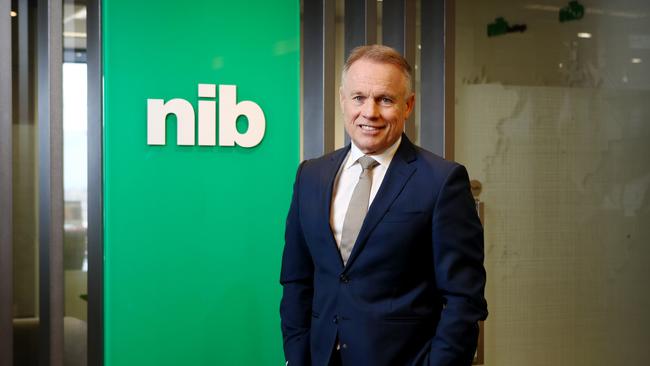NIB blasts community ratings scheme as profit tumbles 27%
Forcing the young to effectively subsidise the health premiums of older Australians is turning into a disaster, NIB says.

NIB managing director Mark Fitzgibbon has lashed out at the health insurance industry’s community ratings scheme after the company’s half year profit plunged more than 27 per cent to $83.2 million.
Mr Fitzgibbon said the first half earnings result was disappointing, citing frustration at the industry’s risk equalisation pool which supports the community ratings scheme that ensures people pay the same health insurance premiums regardless of their health or age.
But Mr Fitzgibbon said NIB was “effectively being penalised”.
“We’re not accustomed to seeing our earnings decline and it’s especially frustrating when our revenue is actually growing right across the group, including in our principal ARHI (Australian residents health insurance) business,” he said.
“NIB indirectly paid other health insurers $126.5 million in 1H20, an incredible 10.3 per cent increase on 1H19. We’re effectively being penalised for our success in growing the market and especially in attracting younger people who mainly foot the risk equalisation bill.
“Plus, as a compensation scheme for hospital claims, risk equalisation in its current design is holding back investment and effort in keeping people healthy and out of hospital.”
However, Mr Fitzgibbon said insurance margins remained strong and “represent a very good return on invested capital”.
Revenue surged 7 per cent to $1.29bn in the six months to December 31, while NIB grew its membership by 1.4 per cent.
Heading for a reset
Last month Mr Fitzgibbon warned a surge in claims would wipe $30m off NIB’s underlying profit, which he expected to be at least $170m, down from $200m previously forecast.
He reaffirmed that guidance on Monday.
“We’re thinking about FY20 as a reset of sorts. We’ve embarked upon a major transformational effort to make our future value proposition much more about people’s better health rather than just responding to sickness or accident,” Mr Fitzgibbon said.
“It’s a future being made real by amazing technological advances in predicting individual disease risk and then more precisely preventing, managing and treating the disease.
“There’s no better evidence than our newly minted joint venture (Honeysuckle Health) with the large US health insurer Cigna. Companies with the scale and expertise of Cigna don’t invest without discipline and a big picture in mind.”
According to the Australian Prudential Regulatory Authority, health insurer net margins declined from 5.2 per cent to 3.9 per cent in 2019. Despite the deterioration in insurance performance, profitability improved due to an increase in net investment income, largely driven by stronger returns in equities in the year ending December.
Mr Fitzgibbon said he expected some margin contraction this year, but not to level of APRA’s industry average.
“With further claims development relating to nib’s FY19 result … FY19 net margin of 6.5 per cent reported at the time of nib’s full year results in August is now 6.2 per cent,” he said at the time of the profit downgrade.
Health cover exit
NIB’s result comes as almost 10,000 Australians dumped private health cover in the last three months of 2019, leaving the share of members with hospital cover at its lowest level in 12.5 years and deepening the industry’s “death spiral” crisis.
Last week, NIB rival Medibank called on the Morrison government to deliver greater healthcare reforms after its half-year net profit sank 9 per cent to $178.6m amid a surge in claims, driven largely by “extraordinary” prostheses costs.
“While the government has taken progressive steps in implementing reforms, which have had some positive impact on the system, there must be recognition that additional meaningful industry cost savings and enhanced industry participation can only be realised through new government reforms,” Medibank chief executive Craig Drummond said.
Macquarie analysts, who have a neutral rating on NIB, said that “participation, out-of-pockets and lifetime health cover loading remain concerns emblematic of headline problems: claims growth being larger than premium growth”.
“Almost every indicator is now pointing towards negative trajectory, reinforcing fears that industry performance could continue to get worse.”
NIB will pay an interim dividend of 10c a share, unchanged from the previous corresponding period, on April 7.




To join the conversation, please log in. Don't have an account? Register
Join the conversation, you are commenting as Logout